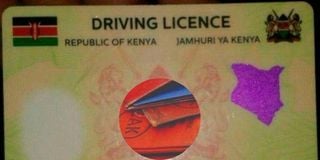NTSA on the spot over smart driving licence project

The old (inset) and new driving licence.
The National Transport and Safety Authority (NTSA) is on the spot for failing to enforce the Smart Driving Licence and unused smart card licences that could cost taxpayers Sh1.19 billion.
Auditor General Nancy Gathungu says the authority has not shown any effort to enforce the use of smart card driving licences, which could result in the wastage of public funds already spent on the project.
In the latest audit of the NTSA's accounts for the year to June 2023, Ms Gathungu said the authority on March 8, 2017, entered into a contract with the National Bank of Kenya consortium for the supply, delivery, installation and maintenance of five million second-generation smart card-based driving licences at a contract sum of Sh2,028,991,964.
“Review of the project status as of June 30, 2023 revealed that the supplier had delivered 4,042,050 smart cards and paid a total of Sh1,195,201,497 out of which, only 1,479,176 cards had been printed for the past six years leaving unutilised 2,562,874 cards valued at Sh788,852,617 that are in the authority’s stores,” Ms Gathungu said.
“The project was initially to run for three years up to March 2020 and therefore it is four years behind schedule.”
Ms Gathungu said the uptake of the smart card licences had been slow.
She said the authority had not shown any effort to enforce the use of the smart card licences, which could lead to a waste of public funds already spent on the project.
“In the circumstances, value for money expended on this project of Sh1,195,201,497 could not be achieved,” Ms Gathungu said in a report tabled in Parliament.
The NTSA introduced the smart driving licences in 2017, with the aim of doing away with physical red book driving licences.
Ms Gathungu said during a physical field verification, it was discovered that the authority had 20 biometric enrolment kits, four of which were faulty.
She said most of the Huduma Centres did not have the biometric kits and only served as collection centres.
“The available kits were also reported to be breaking down due to intermittent overloads. As a result, long queues were observed seeking the services,” Ms Gathungu said in a qualified audit opinion.
The new smart driving licence is a plastic card that fits into a wallet like a bank card.
The new licence meets international standards for driver licensing and identification.
The smart card licence is processed online through the Transport Integrated Management System (Tims), an interactive digital platform launched by the NTSA in 2016.
Until eight years ago, the licensing system was manual and involved a lot of paperwork. Prospective drivers were frustrated by the long and cumbersome process, which created opportunities for underhand dealings.
The multi-page licence was renewed annually or for a period of up to three years. The smart card licence has contributed to better management and security of Kenya's transport system.
The NTSA estimates that 5 million registered drivers will be on the new digital platform when the government retires the red driving licence.
Ms Gathungu lamented the unavailability and inaccessibility of the authority's services, despite them being available online.
“Despite the authority’s services being applied online, the applicants have to physically visit the regional offices for the finalisation of the transactions as collection of logbooks, number plates, smart driving licences and inspection services are carried out at regional offices,” Ms Gathungu said.
“However, it is noted that the Authority had 17 regional offices countrywide and 52 Huduma Center services that served as dispatch centres which were sparsely distributed, far away from the customers/public.”
Ms Gathungu said the distance travelled by the public seeking the service was long, a situation that could have contributed to slow collection rates of number plates and smart driving licences and ultimately low revenue realisation.
She said field verification revealed large stocks of uncollected new generation number plates, vehicle log books and smart driving licences at the regional offices.
Ms Gathungu said records reviewed from 10 regional offices showed stocks of 20,006 number plates, 17,474 log books and 5,753 smart driving licences.
She said the records indicated that the stocks included expired licences, while some logbooks had been in the authority's custody for more than five years.





